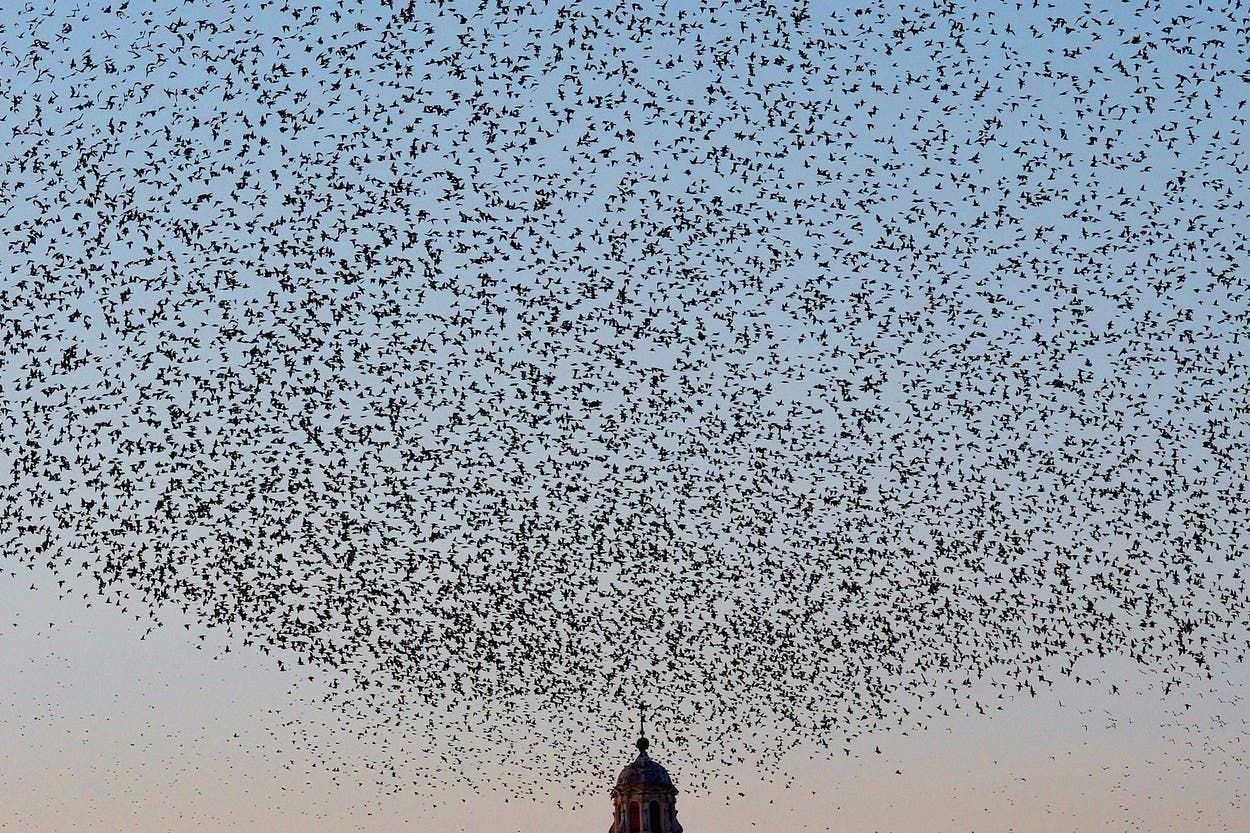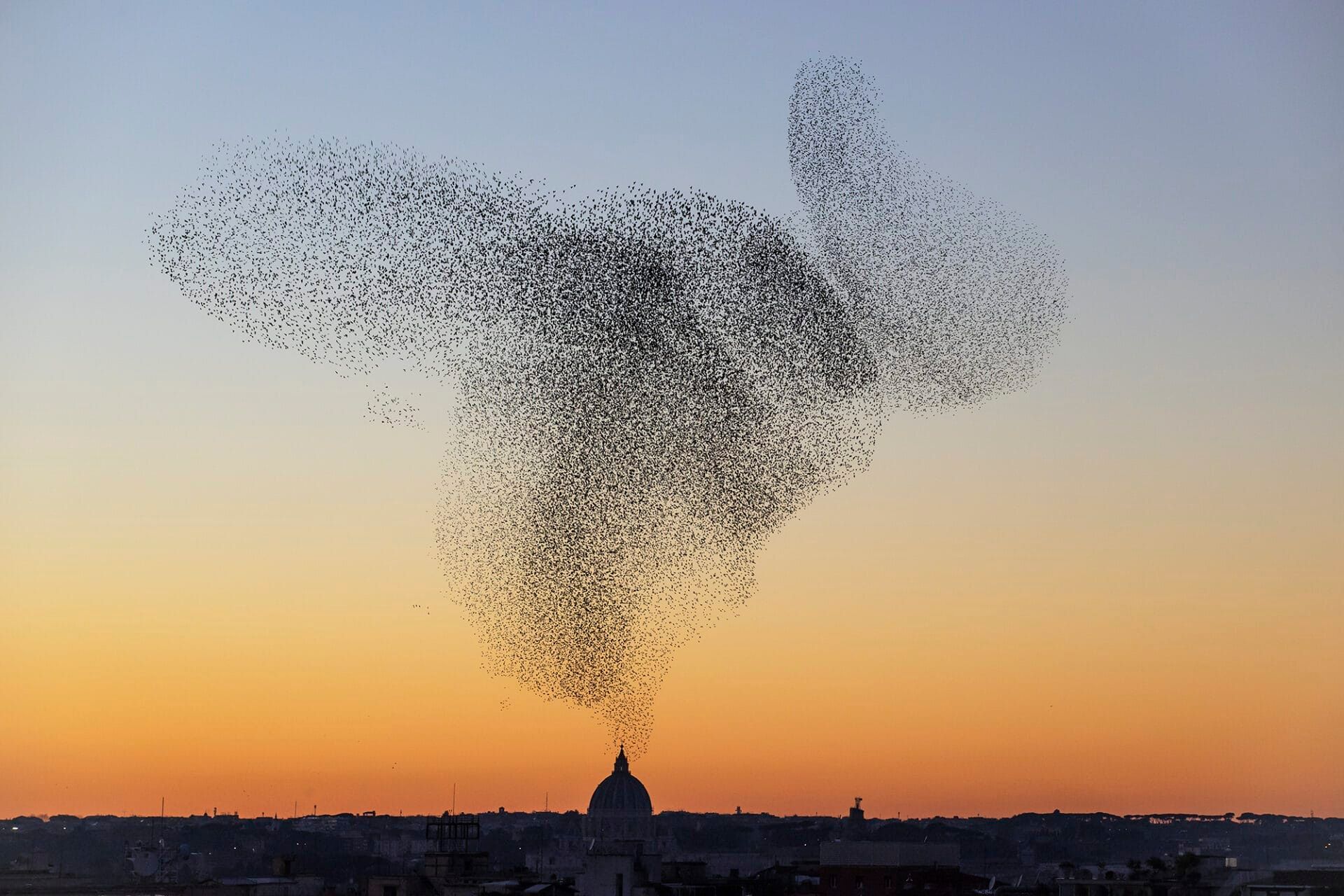Pentecost
The Murmuration of the Spirit
Each evening, late in the year, if you stand on the Janiculum Hill in Rome, you’ll witness something utterly captivating: a great black tide of starlings wheeling and racing through the sky. Tens of thousands of birds, moving as one — sweeping through the dusky air, forming waves and spirals and shifting shapes in perfect unity. It’s called a murmuration — that spontaneous, mysterious, choreography of birds in flight.
Each bird is responding only to the few flying closest to it. None sees the whole picture. And yet, through countless small adjustments, the whole flock moves with grace, cohesion, and astonishing beauty. It is a dance no single bird could perform alone.
Scientists call this emergence — when something greater arises from the coming together of many small parts. Wetness doesn’t exist in a single molecule of water but emerges when trillions move together. No one brain cell contains a thought — yet consciousness arises from their connections. No single bird creates the murmuration — but together, they give rise to something incredible.
What is this body, the Church, that moves across the winds of time? What animates her, as she gracefully moves that makes her something greater than her weak and fragile members? It is, of course, the Spirit of God.
Today, on the feast of Pentecost, we celebrate an emergence: the birth of the Church. The Holy Spirit descended upon a group of frightened disciples in the Upper Room. That same room where, as we just heard, Jesus had promised them another Advocate, one who would be with them as He had been — the Spirit who would make Jesus present to them, guiding their minds and their hearts, would animate them, give them courage, send them forth into the world. The Spirit of the Lord has filled the whole earth.
The Spirit worked to gather scattered disciples, undo the division of Babel, lift with a purpose despondent men. At Pentecost the Church was born — not as an institution or an idea, but as a living, Spirit-filled body.
St Paul describes how that diversity becomes one, how the Spirit gathers lone individuals into the living presence of Christ in his world. Christ is present now, through us. One Body, animated by one Spirit. “There are many gifts,” he says, “but the same Spirit. Many parts — but the same Lord. To each is given the manifestation of the Spirit for the common good.” (1 Cor 12:7) All works together for a purpose. When the Church gathers, when just two or three gather, Christ is there, in the midst, through the power and working of the Holy Spirit, making something greater than its individuals.
When on Pentecost, the apostles proclaimed the mighty works of God Peter had to say: “No, we are not drunk!” An ancient prophecy has been fulfilled. The Spirit would be poured out on all flesh — the young would see visions, the old dream dreams; men and women alike would prophesy.
And from that moment, the Church moved across the centuries, in many lands. The church was born— in prayer, in the breaking of bread, in care for the poor, in glad and generous hearts. Read on in Acts, Chapter 2 — and see how the murmuration begins. How when wings flap together the whole body takes flight, and how today, we still dream dreams and find ourselves being able to do more than we can ever ask or imagine (See Ephesians 3:20).
With the Spirit, what emerges is something greater than ourselves. The Church journeys through time not by the design of one individual, but why the wind of the Spirit. Yes, there are lone birds that don’t dance in harmony. Sometimes it is us. We are sinners, we falter, we are prone to fall. At our worst we give bad example. But at our best, moved by the breath of the Spirit, when we listen to his voice and move in harmony, we are something greater. When we act together with the Spirit of Jesus we can be a leaven in our world, to raise it up out of misery and gloom, because the Spirit animates us with joy.
Together, drawn by the Spirit— like the invisible coherence that binds the birds in flight —the Church journeys through the winds of history to be a living witness to love, joy, peace, forgiveness and justice.
On Pentecost, we do not celebrate a vague force, but a living gift: the very breath of God poured into our hearts. That same Spirit that animates the Body of Christ, unites the Church, and sends her out across the centuries — in mission, in love, in creativity. Crossing borders, breaking down barriers, speaking with new voices.
A church that moves with the Spirit, is always capable of newness — new horizons, new movements, new ways of witnessing to Christ. We can still dream dreams. Each of us can contribute our own small part if we allow the Spirit to hop happily between us. The murmuration falls apart if each bird flies alone. But when our wings flap to the wind of the Spirit, when we fly together, when that mysterious force binds and coheres us into one graceful movement, then we, the Church becomes something beautiful to behold.
The same Spirit who came in fire and wind is not finished yet. The Spirit seeks to work here — today — in us. Let us not underestimate what God can do in us — together. A Spirit-filled Church, like those birds in flight, can move in ways we cannot predict or control. The Spirit of God is poured out upon the Church for a purpose. Together we are part of something much greater than ourselves — that emergence of Pentecost - something beautiful, something holy, something alive with the breath of God.
Come, Holy Spirit, fill the hearts of your faithful.
Make us one. Make us new.
Amen
Abbot Brendan 2025.











